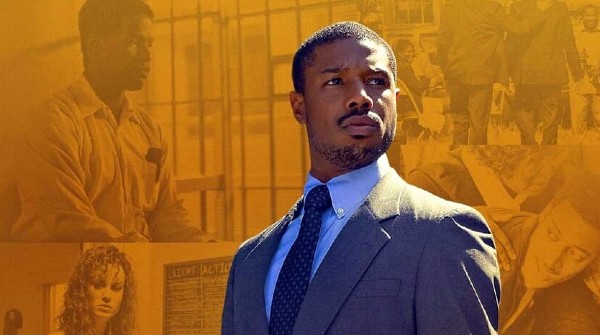Our producer-at-large Father Vince Kuna, C.S.C., a 2016 USC film-school grad, does a regular feature here called BASED ON, looking at literary works adapted into TV or movies.
Just Mercy, a film written and directed by Destin Daniel Cretton based on the book Just Mercy: A Story of Justice and Redemption by Bryan Stevenson. Rated PG-13.
I was introduced to Bryan Stevenson’s book Just Mercy by the similarly titled JustFaith ministry offered by my in-residence parish, St. Monica in Santa Monica, California. Stevenson graduated from Harvard Law School then promptly moved to Alabama. His memoir recounts his professional career of working against bias in the criminal justice system, namely, his advocacy for the poor and minorities.
The book focuses on the case of Walter McMillian, wrongly convicted and condemned for the murder of Ronda Morrison -- more in the real case here -- yet also refers to other cases Stevenson was working on at the time, bolstering the book’s thesis that the McMillian story was part of a systemic problem and not an isolated irregularity.
Released in late 2019, the film Just Mercy, too, acknowledges the problem at hand. Taking interviews with inmates, Stevenson (Michael B. Jordan of Friday Night Lights, Creed and Black Panther fame) quickly ascertains convictions were rushed on dubious “evidence.”
By depicting one of the inmates as white, the filmmakers strengthen their message by showing blacks were not exclusively targeted, but nevertheless make up a disproportionate amount of the cases. Like many a good lawyer, Stevenson focuses on the most egregious case first, that is, the one most likely to be dismissed: Walter McMillian (Jamie Foxx)offer
The film makes a necessary narrowing of scope, there’s only so much to be covered in a two-hour movie that took place in a 400-page book. That said, there’s plenty more cases referred to in the book and subsequent career of Stevenson that could be adapted into a limited or procedural TV series.
I thought the slow pacing of the film to be appropriately deliberate. It reminded me of the 2006 film Amazing Grace, which dealt with the abolition of the slave trade throughout the British Empire in the 19th century. I distinctly remember walking out the film drained, having a sense the work of justice required the sustained efforts of tireless lawyers William Wilberforce and William Pitt. Stevenson, too, logs uncountable hours, to the detriment of his romantic life — he chose not to marry, citing his profession demanded a singular, vocational focus.
Given the context of our country’s current moment, Warner Brothers is allowing Just Mercy to stream for free during the month of June on Amazon Prime Video and several other platforms (more info here). If you’re open to the deliberate pacing and to have previous misconceptions challenged, the film “pays off” by the end. Racism, after all, comes about through personal ignorance and blindness, sometimes trickling into America’s most esteemed and storied institutions
As time-consuming and back-breaking as practicing law can be, Stevenson is never one to pat himself on the back. There’s a consistent referencing of faith throughout the film. He credits grace, from whom any work of justice comes.
A final sequence shows inmates tapping coffee cups against their cell bars as McMillian leaves a free man. The sound design echoes improvised church bells. Justice satisfies the soul, for sure. And being open to Grace, "oh, how sweet the sound.”
Image: Warner Bros.
Click here to visit Father Vince Kuna’s IMDB page.
Keep up with Family Theater Productions on our website, Facebook, Twitter, Instagram and YouTube.
